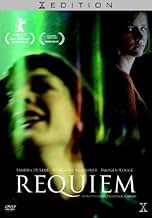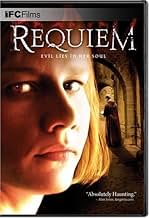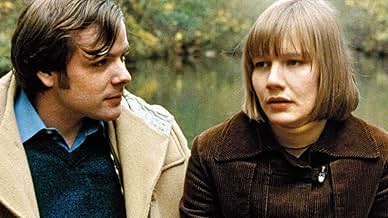CALIFICACIÓN DE IMDb
6.8/10
6.6 k
TU CALIFICACIÓN
Agrega una trama en tu idiomaA young woman with epilepsy suffers a breakdown during her first year at university, then decides to seek help from a priest in battling the troubles associated with her strict upbringing.A young woman with epilepsy suffers a breakdown during her first year at university, then decides to seek help from a priest in battling the troubles associated with her strict upbringing.A young woman with epilepsy suffers a breakdown during her first year at university, then decides to seek help from a priest in battling the troubles associated with her strict upbringing.
- Premios
- 16 premios ganados y 19 nominaciones en total
- Dirección
- Guionista
- Todo el elenco y el equipo
- Producción, taquilla y más en IMDbPro
Opiniones destacadas
To be frank I completely disagree with the above critique. I found this film quite moving and very sad - I still can't stop thinking about.
I thought the way it was shot moved it along fairly nicely and was thankfully fairly anti- Hollywood which was a nice relief. Of course most Americans will probably not enjoy it because it's too subtle, nothing explodes and they actually have to think for a change rather than being told how to feel. If Hollywood had done this film it would have been all moody lighting, scary music and SFX - it would have been just another badly done version of The Exorcist (which I think is also a great film).
I think what I found the most interesting was that because this film was done in such an understated manner, you could actually understand what Michaella was going through in a much more realistic, believable manner.
There is a beautiful scene where near the end of the film Michaella's boyfriend takes her to her parents house because she is in such a bad state. She is soon surrounded by her parents and two priest all praying and chanting at her trying to exorcise her demons - her boyfriend steps away as he really doesn't know where to put himself or what to do as he watches the chanting - he looks like he is witnessing the dark ages of superstition; all completely anachronistic to the time he lives in.
Documentary style was a great choice - there were no true good or bad guys. And Michaella truly believed that she was possessed. So in a really strange way it was more an analysis of faith and belief. At the end of the day she, her family and the creepy priest all absolutely believed that she was possessed therefore she was.
Was that a good or bad thing, considering that nowadays most people barely believe anything at all?
Maybe she did fight an epic battle against demons for our souls like Saint Margarita - can anyone prove otherwise?
I thought the way it was shot moved it along fairly nicely and was thankfully fairly anti- Hollywood which was a nice relief. Of course most Americans will probably not enjoy it because it's too subtle, nothing explodes and they actually have to think for a change rather than being told how to feel. If Hollywood had done this film it would have been all moody lighting, scary music and SFX - it would have been just another badly done version of The Exorcist (which I think is also a great film).
I think what I found the most interesting was that because this film was done in such an understated manner, you could actually understand what Michaella was going through in a much more realistic, believable manner.
There is a beautiful scene where near the end of the film Michaella's boyfriend takes her to her parents house because she is in such a bad state. She is soon surrounded by her parents and two priest all praying and chanting at her trying to exorcise her demons - her boyfriend steps away as he really doesn't know where to put himself or what to do as he watches the chanting - he looks like he is witnessing the dark ages of superstition; all completely anachronistic to the time he lives in.
Documentary style was a great choice - there were no true good or bad guys. And Michaella truly believed that she was possessed. So in a really strange way it was more an analysis of faith and belief. At the end of the day she, her family and the creepy priest all absolutely believed that she was possessed therefore she was.
Was that a good or bad thing, considering that nowadays most people barely believe anything at all?
Maybe she did fight an epic battle against demons for our souls like Saint Margarita - can anyone prove otherwise?
This movie doesn't have a clear message. Instead the title "requiem" really shows what this is about: looking at a person's life in every aspect of it. So the storytelling has to be much more from a distant viewpoint. Some may call this documentary-style as it seems to show a real social case study. Personally it reminded me a little bit of the early Scorseses style of movie-making (e.g. taxi driver): neutral viewpoint, but still subtle messages within, and finally the big clash in the ending, when all strings of the story developed throughout the movie come together.
For me, this is the best way of doing such a movie. First everything feels so normal as you watch the movie. In the end extreme situations begin to develop. Because you know the context, even it is a really extreme situation, it seems to be not at all inexplicable but very real, which it actually was. I could personally feel the helplessness with this situation, because I could not blame anybody in the movie, there was not a side who did anything wrong on purpose. All are just human beings, who are presented perfectly and believable through very good acting. The final shot of the girl's face with background organ music expresses many feelings I have about the movie.
All in all it is a very good movie, but of course it still does not feel as great as some of the best movies of the time. 9 stars
For me, this is the best way of doing such a movie. First everything feels so normal as you watch the movie. In the end extreme situations begin to develop. Because you know the context, even it is a really extreme situation, it seems to be not at all inexplicable but very real, which it actually was. I could personally feel the helplessness with this situation, because I could not blame anybody in the movie, there was not a side who did anything wrong on purpose. All are just human beings, who are presented perfectly and believable through very good acting. The final shot of the girl's face with background organ music expresses many feelings I have about the movie.
All in all it is a very good movie, but of course it still does not feel as great as some of the best movies of the time. 9 stars
I've seen both The Exorcism of Emily Rose and this one and found Requiem to be far better and realistic than the other. Emily Rose, in my opinion, was supposed to be commercial Hollywood film. It lulled me to sleep whereas Requiem kept me interested during its entirety. The chief reason for this being the phenomenal performance by the lead actress.
The direction of the film is great as well, since it clearly allows the viewers to form their own decision whether the girl is possessed or schizophrenic. Viewers make their decisions based on which side of the faith they lie. It runs a bit slow but is an excellent psycho-drama devoid of any gratuitous scary scenes.
So overall, in case you like scary stuff, watch Emily Rose; which is not such a great scary movie either. However, if you like psychological dramas and do not wish to watch movies that make you jump out of your seat, watch this one.
The direction of the film is great as well, since it clearly allows the viewers to form their own decision whether the girl is possessed or schizophrenic. Viewers make their decisions based on which side of the faith they lie. It runs a bit slow but is an excellent psycho-drama devoid of any gratuitous scary scenes.
So overall, in case you like scary stuff, watch Emily Rose; which is not such a great scary movie either. However, if you like psychological dramas and do not wish to watch movies that make you jump out of your seat, watch this one.
A sad tale of a young girl's aspirations disastrously ruined by her and her family's inability to separate her religion from her mental illness.
The script is commendably non-judgemental, despite the subject matter, and the the movie's early seventies setting is re-created so convincingly (with muted colours and almost dogme-like camera work) that one might forget that the film was shot only three years ago.
Some may find that the film ends before the story does, but this is merely a refreshing refusal to pander to sensationalism that is completely in keeping with the naturalistic realism of the film as a whole.
The script is commendably non-judgemental, despite the subject matter, and the the movie's early seventies setting is re-created so convincingly (with muted colours and almost dogme-like camera work) that one might forget that the film was shot only three years ago.
Some may find that the film ends before the story does, but this is merely a refreshing refusal to pander to sensationalism that is completely in keeping with the naturalistic realism of the film as a whole.
Requiem works for many reasons--an intelligent script, understated direction, a somewhat verite camera style--but most of all it works because of Sandra Huller. For all of Michaela's exceptionalism, at no point could I doubt this character. As a recovering Catholic myself, I'm sensitive to the role religion, especially Catholicism, plays in people's lives; and Huller, in my opinion, creates the real thing: implicit faith that needs neither to advertise nor to apologize. Michaela's faith isn't about doctrine or rules but the meaning of life--more specifically, about living the meaning of one's own life, including its less attractive implications. Her faith makes her vulnerable to the devil (or, if you prefer, to her imagination that the devil is messing with her), but her faith also endows her growing suffering (and her eventual death, which she clearly foresees; note her reference to "martyrdom" in one of the last scenes) with an abundance of the same meaning that has sustained her life. She is peaceful at the end ("I must walk my path to the end.") That may be hard for a non-religious person to understand, but to someone raised on stories of the great saints, as Michaela was, it makes perfect sense. It is even something to be grateful for.
Requiem pulls off a bit of cinematic legerdemain in making Michaela a relatively open, non-fanatical, non-prudish woman in spite of the depth of her faith. Her real-life original, Anneliese Michel, wasn't much like that. She was a very conservative Catholic deeply opposed to the liberalization then occurring in the Catholic church after the Vatican Council. Her death and the subsequent trial of her parents and the exorcists forced a kind of confrontation, at least in Germany, between Catholic traditionalism, which has an entirely literal belief in spiritual realities and regards demonic possession and exorcism as established facts, and ecclesiastical modernism, which is embarrassed by such medieval notions and therefore preferred to take the position that Michel was "merely" mentally disturbed. (And if she were, did she suffer any the less? Was her faith any less meaningful to her?) Traditionalists regard Michel, her parents, and the exorcists as martyrs to a modernist church disloyal to its Christian past, and Michel's grave is today a pilgrimage site primarily for conservative Catholics. You'd never guess any of this from Requiem's very sympathetic treatment of her story.
Requiem pulls off a bit of cinematic legerdemain in making Michaela a relatively open, non-fanatical, non-prudish woman in spite of the depth of her faith. Her real-life original, Anneliese Michel, wasn't much like that. She was a very conservative Catholic deeply opposed to the liberalization then occurring in the Catholic church after the Vatican Council. Her death and the subsequent trial of her parents and the exorcists forced a kind of confrontation, at least in Germany, between Catholic traditionalism, which has an entirely literal belief in spiritual realities and regards demonic possession and exorcism as established facts, and ecclesiastical modernism, which is embarrassed by such medieval notions and therefore preferred to take the position that Michel was "merely" mentally disturbed. (And if she were, did she suffer any the less? Was her faith any less meaningful to her?) Traditionalists regard Michel, her parents, and the exorcists as martyrs to a modernist church disloyal to its Christian past, and Michel's grave is today a pilgrimage site primarily for conservative Catholics. You'd never guess any of this from Requiem's very sympathetic treatment of her story.
¿Sabías que…?
- TriviaSandra Hüller's feature film debut.
- ConexionesFeatured in The Making of 'Requiem' (2006)
- Bandas sonorasDown 'n' Out
Performed by Light of Darkness
Written by J. Latimer, B. Grant, M. Reoch and M. Bebert
Courtesy of MOP-Musikverlag Hans Sikorski KG
With kind permission of Second Battle Records
Selecciones populares
Inicia sesión para calificar y agrega a la lista de videos para obtener recomendaciones personalizadas
- How long is Requiem?Con tecnología de Alexa
Detalles
- Fecha de lanzamiento
- País de origen
- Sitio oficial
- Idioma
- También se conoce como
- Requiem
- Locaciones de filmación
- Productoras
- Ver más créditos de la compañía en IMDbPro
Taquilla
- Total en EE. UU. y Canadá
- USD 9,600
- Fin de semana de estreno en EE. UU. y Canadá
- USD 3,309
- 22 oct 2006
- Total a nivel mundial
- USD 262,460
- Tiempo de ejecución1 hora 33 minutos
- Color
- Mezcla de sonido
- Relación de aspecto
- 2.35 : 1
Contribuir a esta página
Sugiere una edición o agrega el contenido que falta














